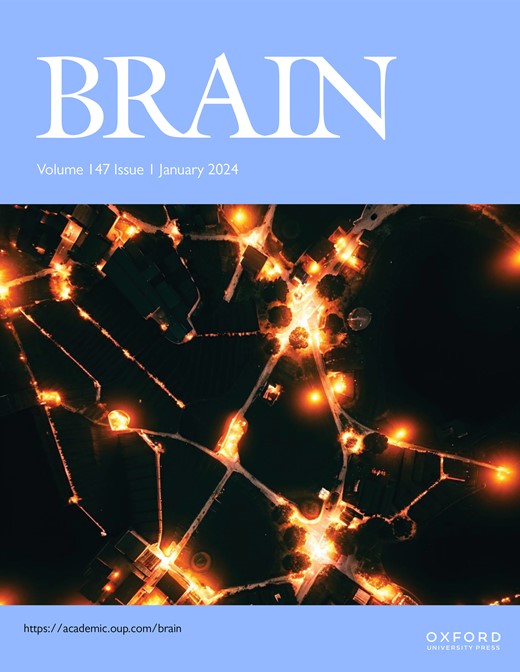Loss of DOT1L disrupts neuronal transcription and leads to a neurodevelopmental disorder
IF 10.6
1区 医学
Q1 CLINICAL NEUROLOGY
引用次数: 0
Abstract
Individuals with monoallelic gain-of-function variants in the histone lysine methyltransferase DOT1L display global developmental delay and varying congenital anomalies. However, the impact of monoallelic loss of DOT1L remains unclear. Here, we sought to define the effects of partial DOT1L loss by applying bulk and single-nucleus RNA-sequencing, ChIP-sequencing, imaging, multielectrode array recordings, and behavioral analysis of zebrafish and multiple mouse models. We present a cohort of 16 individuals (12 females, 4 males) with neurodevelopmental disorders and monoallelic DOT1L variants, including a frameshift deletion, an in-frame deletion, a nonsense, and missense variants clustered in the catalytic domain. We demonstrate that specific variants cause loss of methyltransferase activity. In primary cortical neurons, Dot1l knockdown disrupts transcription of synaptic genes, neuron branching, expression of a synaptic protein, and neuronal activity. Further in the cortex of heterozygous Dot1l mice, Dot1l loss causes sex-specific transcriptional responses and H3K79me2 depletion, including within down-regulated genes. Lastly using both zebrafish and mouse models, we found behavioral disruptions that include developmental deficits and sex-specific social behavioral changes. Overall, we define how DOT1L loss leads to neurological dysfunction by demonstrating that partial Dot1l loss impacts neuronal transcription, neuron morphology, and behavior across multiple models and systems.DOT1L的缺失会破坏神经元转录并导致神经发育障碍
具有组蛋白赖氨酸甲基转移酶DOT1L单等位基因功能获得变异的个体表现出整体发育迟缓和不同的先天性异常。然而,单等位基因缺失对DOT1L的影响尚不清楚。在这里,我们试图通过应用大量和单核rna测序、chip测序、成像、多电极阵列记录以及斑马鱼和多种小鼠模型的行为分析来定义部分DOT1L丢失的影响。我们提出了一组16人(12名女性,4名男性)的神经发育障碍和单等位基因DOT1L变异,包括移码缺失,帧内缺失,无义和错义变异聚集在催化结构域。我们证明了特定的变异导致甲基转移酶活性的丧失。在初级皮层神经元中,Dot1l敲低会破坏突触基因的转录、神经元分支、突触蛋白的表达和神经元活性。此外,在杂合子Dot1l小鼠的皮质中,Dot1l缺失导致性别特异性转录反应和H3K79me2耗用,包括在下调基因中。最后,使用斑马鱼和小鼠模型,我们发现行为中断包括发育缺陷和性别特异性社会行为改变。总的来说,我们通过证明部分DOT1L丢失影响多个模型和系统的神经元转录、神经元形态和行为来定义DOT1L丢失如何导致神经功能障碍。
本文章由计算机程序翻译,如有差异,请以英文原文为准。
求助全文
约1分钟内获得全文
求助全文
来源期刊

Brain
医学-临床神经学
CiteScore
20.30
自引率
4.10%
发文量
458
审稿时长
3-6 weeks
期刊介绍:
Brain, a journal focused on clinical neurology and translational neuroscience, has been publishing landmark papers since 1878. The journal aims to expand its scope by including studies that shed light on disease mechanisms and conducting innovative clinical trials for brain disorders. With a wide range of topics covered, the Editorial Board represents the international readership and diverse coverage of the journal. Accepted articles are promptly posted online, typically within a few weeks of acceptance. As of 2022, Brain holds an impressive impact factor of 14.5, according to the Journal Citation Reports.
 求助内容:
求助内容: 应助结果提醒方式:
应助结果提醒方式:


